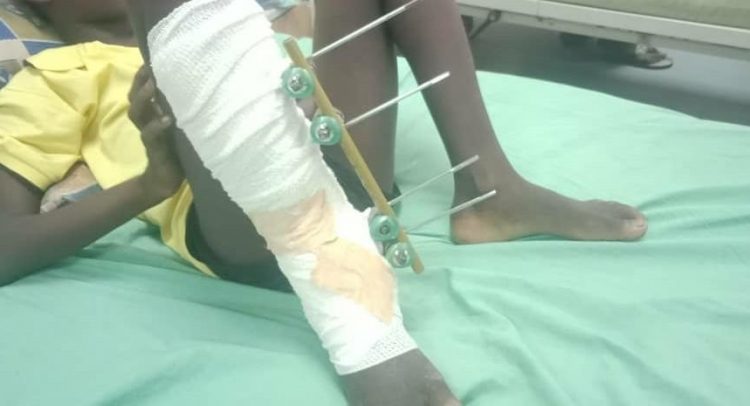An amputated kid
The Tamale Teaching Hospital (TTH) has since 2015 to 2018 carried out various amputation surgeries for 36 children between ages one week to 16 years.
The children underwent the surgeries as a result of road and domestic accidents they suffered within the period.
Dr. Noel Tolgou Yempabe, the consultant orthopaedic and head of the Trauma Unit at the TTH, said most of the amputations could have been prevented if not for delays at traditional bonesetters.
Dr. Yempabe disclosed that although bonesetters play an important role in managing fractures by using traditional methods, their activities mostly lead to severe complications resulting in the amputations and other health risks, especially among children.
He said most patients with fractured injuries first port of call usually is non-hospital services, delaying their arrival at the hospital with complications like massive swelling associated with pain which could cause amputations.
Dr. Yempabe stated that these complications contribute significantly in prolonging hospital stays, increased financial expenditure and psychological burden on caregivers.
He indicated that amputations in children were uncommon and often done in emergency situations as life-saving procedures or as planned cases resulting from congenital limb deficiencies.
“Whatever the case may be, losing a limb is a difficult and emotional situation for the patient, family and the health professionals who were directly involved in the care of the patient. Even though the trauma-related amputations are often done in a haste to save the child’s life, the orthopaedic surgeon must pay critical attention to the basic principles of creating a prosthetic friendly stump like adjustment of the limb which is also costly,” Dr. Yempabe added.
He indicated that after successfully undergoing amputations, amputee children face numerous physical and psychosocial challenges with possible denting implications on future functionality and ambitions.
Dr. Yempabe said rehabilitation and obtaining the right prosthesis are extremely important in providing some psychological and physical support, adding that there should be limb prosthesis that provides physical support for children to enable them to participate in some activities of daily living.
He advised members of the public to ensure that trauma cases are taken to the hospital as first port of call for proper medical care to save the victims from amputation.
GNA


